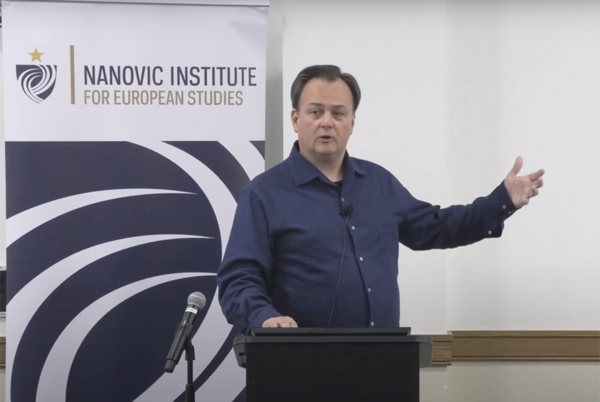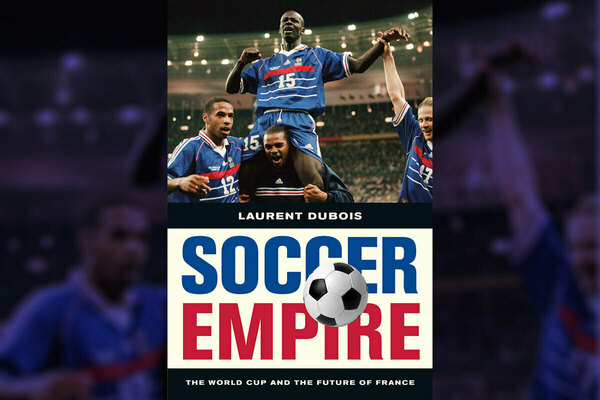
Laurent Dubois is John L. Nau III Bicentennial Professor in the History & Principles of Democracy and Director for Academic Affairs of the Democracy Initiative at the University of Virginia. He is the author of seven books, including A Colony of Citizens: Revolution and Slave Emancipation in the French Caribbean, 1787-1804 (2004), Haiti: The Aftershocks of History (2013), Soccer Empire: The World Cup and the Future of France (2010), The Language of the Game: How to Understand Soccer (2018), and The Banjo: America’s African Instrument (2016).
Will Beattie, a fifth-year Ph.D. student in the Medieval Institute at the University of Notre Dame, has written a summary of Dubois’ lecture, which may also be re-watched on the Nanovic Institute’s YouTube page.
Watch lecture View Decolonizing Scholarship Poster

On March 31, 2023 Dr. Laurent Dubois delivered a lecture on “Decolonizing Scholarship in French and Francophone Studies.” He began at the end, giving the audience a “sneak preview” of what was to come: a photograph of the 1998 FIFA World Cup. Two French players, Christian Karembeu and Lillian Thuram, captured on camera, at the moment the “Marseillaise,” the French national anthem, was sung in the stadium before a World Cup final in which France would emerge as the champions. In the photograph, Karembeu remains stoic, his mouth closed. He would later say “I can’t sing the French national anthem because I know the history of my people.” Thuram sings loudly, “with real verve” as Dubois put it. He sang as a Frenchman celebrating France. One photograph, two players, and two radically different responses to a historical and political moment.
But before getting there, he started again, this time at the beginning. Dubois explained the structure of his talk: he would offer general thoughts on what decolonizing scholarship means to him, and how to do it. Then he would take three moments from Francophone history, three snapshots — ending with Karembeu and Thuram on that fateful day in 1998 — to ask how we can use sources to think differently about larger narratives.
What it means to Decolonize Scholarship
A discussion of how to decolonize scholarly work has to begin with the acknowledgment that the very university system in which academics are engaged is born of colonialism. This is where Dubois began his investigation. The structures which now represent global university education originate in continental Europe and were exported to the wider world as part of the colonial process.
However, Dubois contended that the relationship between Europe and the world was far more bilateral than this might suggest. During the Renaissance, when Europeans first became aware of the Americas, intellectual thought was increasingly shaped by this Euro-American interaction. Any attempt to understand history that isolates Europe from the Americas, or indeed from any part of the world, will inevitably lead to an imperfect and partial vision.
Recognizing this fact brings us to the "matrix." For Dubois, projects of decolonizing knowledge take place within a deeply anchored matrix, an overlapping series of systems and ways of understanding that shape our perception of the world. It may be suffocating at times, but we can approach this matrix critically and, in doing so, learn to ask the right questions. Eventually, we realize that we are not stuck in one matrix, but can in fact use different analytical matrices to interpret the world. That is to say, the colonial worldview can be challenged, overcome, and seen as just one of many possible ways of seeing reality. There have always been ways of functioning that go beyond European or colonial systems. New patterns of functioning emerged in resistance to colonialism. To imagine different futures, we need to explore these competing ways of understanding history between colonial and non-colonial projects.

An Island Brazil in Rouen
The first of Dubois’ case studies brought the audience to Rouen, France, in 1550. To celebrate the visit of King Henry II, the city staged elaborate spectacles and processions, the jewel of which was an island in the Seine populated by about 150 “Brazilians.” Of these, around one hundred were French men and women dressed as native Brazilians, but the remaining fifty were indigenous Brazilians. Flora and fauna were imported to recreate the Amazon River in northern France. Dubois used this event to ask “who were these Brazilians? And who were these French performers?”
From here, Dubois led the audience through different ways in which France and Brazil interacted in the 16th century. In a case of French immigration to South America, he explained how merchants would leave young French boys in Brazilian communities so that they would learn local languages, customs, and (most importantly) the location of valuable brazilwood. Representing indigenous Brazilian integration into France, Dubois spoke of a Brazilian princeling who traveled to France (supposedly thanks to his fascination with canons) and founded a French dynasty that exists to this day. Finally, Dubois explored texts in which conversations between Europeans and Brazilians about philosophy, civics, and society were recorded. Historians of Europe have long assumed these conversations to be imagined, believing that they could never have occurred. But, more recently, scholars have come to believe that these conversations did take place.
The intellectual world of Europe was shaped by real contact with South America. Dubois argues that decolonial scholarship must recognize and explore these emerging understandings of the connections between Europe and the Americas as complex, bilateral systems of exchange that helped shape the Enlightenment.
Language and The Haitian Revolution
For his second case study, Dubois introduced the Haitian Revolution as a focal point of historical and linguistic practices. The archive of the Haitian Revolution is almost unique in the history of European colonialism, largely because the uprising succeeded; the victors were able to preserve their history. As Dubois put it, “they took control, and took voice.” But this raises a question: what was the language of the Revolution? We often put too much emphasis on written language, but orality is often a driving force of revolution. Hushed conversations, speeches and protests are all necessary for success.
18th century Haiti was a place of many languages, and many enslaved peoples were highly educated before they were stolen from their homes. Students of Quranic schools were present in Haiti, as demonstrated by the existence of an Arabic text from 1770. Haitian Creole was in its infancy in the mid-18th century. During the Haitian Revolution, early Creole and several (mostly Central) African languages were spoken. Most of the revolutionaries were African born, the majority in what is now the Congo. The Middle Passage — the terrible journey that carried enslaved Africans across the Atlantic towards the Americas — was recorded in song. Dubois played two Creole songs which have survived for over two centuries and both narrate the Middle Passage in the present tense, bringing the audience into the context. He showed that several Haitian songs composed in the 18th century contain precise details about people, places, and events from the Revolution. The language of the Revolution preserves the diverse voices that came together to overcome slavery and create, as Dubois argues, the first true liberal democracy.
The Beautiful Game
The final case study brought the audience back to the very beginning: the 1998 World Cup. Dubois explored the history of soccer in France, which has a uniquely long history of having non-white players on its national team. The 1938 team, for example, included French Guianese Raoul Diagne, and Moroccan Larbi Benbarek.
Dubois then returned to the photo with which he had opened the lecture. Christian Karembeu and Lillian Thuram standing together for the national anthem, Thuram singing boldly, Karembeu stoic and silent. Dubois set out the context for their responses. Far-right politician Jean-Marie Le Pen had attacked the French team, claiming that the non-white players were not truly French. As Dubois put it, the French team became politicized, and the locker room was like a seminar at times as the players debated Francophone history.
For Dubois, French football captures many of the tensions that remain at play for France and the countries around the world that it colonized. In the 1998 World Cup, Zinedine Zidane, of Algerian descent, and Christian Karembeu, born in New Caledonia, scored goals in the semi-final and final. In 2006, when Le Pen claimed that there were too many black players on the French team, Lilian Thuram responded by saying that “it doesn’t matter if we’re black or not, because we’re French.”
French football highlights France’s colonial past and the ways in which understandings of being “French” have changed over the decades. In the question and answer that followed the lecture, an audience member asked whether Dubois felt that the unity demonstrated by the French team had carried over into French society. Dubois’ response acknowledged that the camaraderie and national pride often felt in the wake of a major sporting victory, like winning the 1998 World Cup, fades over time. The bonhomie dissipates and old prejudices raise their heads. However, over time he believes that the racial diversity of the French team has made a difference. In 1998, French players had to defend their “Frenchness.” Today, superstar players like Kylian Mbappe, who has Cameroonian and Algerian heritage, are accepted as French without question by the younger generations. The beautiful game has shaped how French people see themselves.
History, like Dubois’ lecture, can not be neatly segmented and told as a cohesive, linear tale. It is a lattice of intersecting stories, of things that happen in different parts of the world to different people and somehow come together. To decolonize scholarship we must reject the simple, Eurocentric narrative that has dominated scholarship, and accept that the rest of the world has shaped Europe just as much as Europe has shaped the rest of the world.

Will Beattie is a fifth-year Medieval Studies PhD candidate in Notre Dame’s Medieval Institute. His research on Old English apocalyptic literature explores early medieval cultures of preaching, textual adaptation, and the interplay between religion, politics, and identity. He is a Nanovic Institute Graduate Fellow and co-editor of the Medieval Institute’s Meeting in the Middle Ages podcast.
Originally published by at eitw.nd.edu on April 17, 2023.